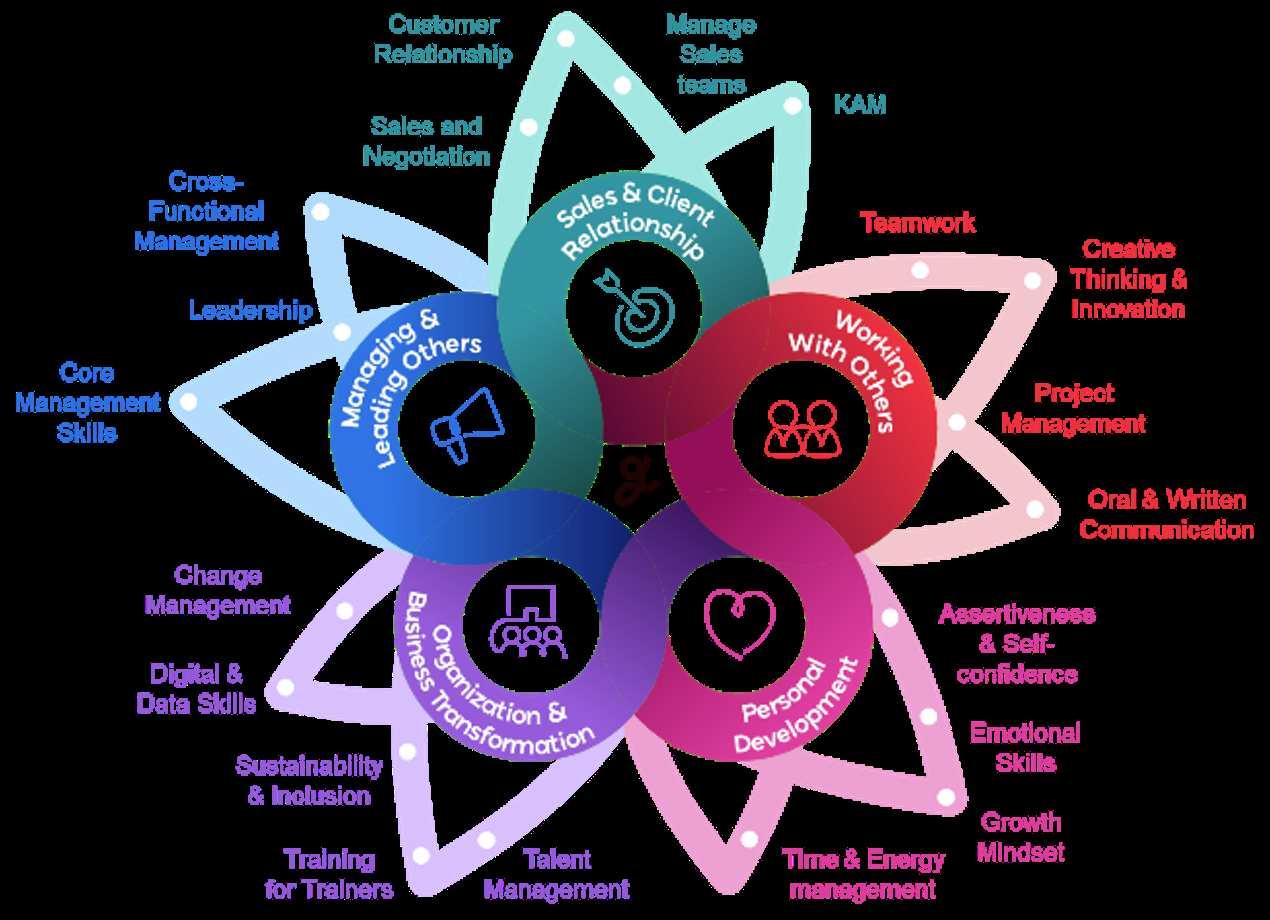
Cegos 2025 International Barometer
First-time managers: understanding and supporting a key population for organisational performance and transformation


Cegos 2025 International Barometer
First-time managers: understanding and supporting a key population for organisational performance and transformation
A global partner: Germany, Spain, France, Italy,Portugal, United Kingdom, Switzerland, China, Asia-Pacific, Brazil, Chile, Mexico and the United States.
Cutting-edge training in the areas of:
• Management and leadership
• Sales and customer relations
• Project management
• Professional and personal efficiency
• AI and digital
• Marketing and Communication
• Information Systems
• Sustainable Development and CSR
• Finance
• Purchasing
• Human Resources
• Training...
countries through a network of partners and distributors Present in more than 50 digital contents in more than + 4,000 languages 30
250 M€ employees and partner consultants 1,500 + 3,000 customer companies
million in turnover
20,000 connected learners
2.5 M
1 M
people trained face-to-face every year and +250,000 users of our Group Digital Assets

In a rapidly transforming world of work, the role of managers has never been more critical.
The rise of hybrid work, the acceleration of technological change, growing expectations around social and environmental responsibility, and the need for organizations to remain attractive all contribute to a demanding context for those taking on the responsibility of leading a team for the first time. These first-time managers face a complex equation: they must oversee operational activities, drive deep transformations, support their teams with empathy… all while still learning how to manage. This is why we have launched this brand-new international barometer: to give a voice to these first-time managers, as well as to the HR departments that support them.
This first edition confirms a strong belief: to succeed, first-time managers must be prepared, supported, and trained well before they take on their role. More than that, they need to be able to see themselves in a role that has meaning, for them, their teams, and their organization.
At Cegos, we are convinced that training is one of the most powerful levers to secure this transition, and to foster a more human, agile, and sustainable management style, one that supports both the transformations organizations must lead and the talents they need to nurture.
Benoit Felix, President of Cegos Group
Cegos, international leader in Learning & Development, has launched a brand-new international barometer dedicated to first-time managers, employees taking on managerial responsibilities for the very first time.
Conducted in March 2025 across 10 countries in Europe, Latin America, and Asia, the study sheds light on the journey, expectations, and challenges of this strategic managerial tier, crucial to both organisational performance and the many transformations companies must drive.
Through this study, Cegos gives a voice to those who have taken on a managerial role within the past two years, as well as to Human Resources (HR) Directors and Managers, to better understand their respective expectations regarding the role of first-time managers and the skills they are expected to master.
This first edition of the barometer presents a portrait of highly motivated first-time managers, eager to contribute to collective performance, generally well supported by their organisations, yet facing increasing workloads and a need to master an ever-wider range of skills.
This survey was conducted online in March 2025 across 10 countries: France, Germany, Italy, Portugal, Spain, United Kingdom (Europe); Singapore (Asia); Brazil, Mexico, and Chile (Latin America), among 4,271 first-time managers and 441 HR/Training Directors or Managers.
How and why do people become managers? p. 6
What kind of support do first-time managers receive? p. 10
First-time managers: builders of performance and agents of change p. 14
First-time managers are committed… but under pressure p. 18
Leadership, communication and empathy: the soft skills at the core of management p. 22
Overall, first-time managers are happy in their role p. 26
Cegos, by your side to train and support first-time managers p. 28
Working with you to turn skills into performance p. 30
Recruiting new managers remains a challenge:
• 42% of HR professionals struggle to recruit first-time managers.
• 68% believe their employees do not always possess the behavioural skills required to step into managerial roles.
Top motivations for becoming a manager include:
• better compensation (37%),
• problem-solving (37%),
• and contributing to performance (31%).
HR expectations of first-time managers are focused on:
• achieving growth and profitability objectives (41%),
• building high-performing teams (37%),
• optimising work processes (32%).
Support during the transition is generally strong:
• 74% of first-time managers have received training and support
• 56% were supported even before taking on the role.
They feel well-equipped for their responsibilities:
• 95% say they have a clear understanding of their role.
Workload is a growing concern:
• 67% report an increase in their working hours.
They are actively engaged in current organisational transformations:
• 78% are involved in AI adoption,
• 77% are engaged in CSR initiatives.
Overall job satisfaction is high:
• 89% are satisfied with their performance
• 77% would recommend taking on a managerial role.
Priority skills to develop, according to both first-time managers and HR professionals, include:
• Leadership and team motivation,
• Clear and effective communication with the team,
• Fast and strategic decision-making.
Nearly 4 in 10 HR professionals (42%) report difficulties in recruiting or identifying first-time managers
The primary challenge lies in detecting profiles with managerial potential: 68% of HR respondents globally believe that internal candidates often lack the behavioural skills required for such roles. Adding to the challenge, 36% of identified employees do not wish to take on a managerial position
While internal promotion remains the most common pathway into management, favoured by 55% of HR professionals, the criteria used to select future managers can vary by country.
At the international level, HR respondents give equal importance to interpersonal and relational skills (50%) and technical expertise (also 50%) when promoting an employee to a managerial position.
What are the two main reasons why you choose to promote an employee to a managerial role?
Their human or managerial skills
Their expertise in the team’s field or scope
Their engagement and performance in their current role Their
Cegos 2025 International Barometer
In Singapore, for example, HR professionals pay particular attention to employees’ personal development potential, with 37% citing it as a key criterion. This reflects a forward-looking approach to management, where growth capacity takes precedence over technical mastery or already acquired competencies.

For the vast majority of first-time managers surveyed, stepping into a managerial position was first and foremost a personal and deliberate decision. At the global level, 69% say they actively expressed the desire to take on a management role
The result is even more striking in Singapore, where 82% of first-time managers said they volunteered for the position. This reflects a strong cultural emphasis on leadership development, but also relates to a tight labour market and very low unemployment rates.
Laurence Ballereaud, Director of tailored Management & Leadership training Projects at Cegos, explains:
“These findings highlight the strategic importance, for organisations, of early identification of employees with managerial potential. Successful internal promotions depend on the ability to detect, upstream, those capable of going beyond their technical or functional expertise to adopt a leadership posture and demonstrate the ability to engage and unite teams.
At the organisational level, the fact that HR professionals give equal weight to job expertise and behavioural skills when appointing managers reflects a significant shift in what defines managerial legitimacy. The role is less and less seen as a relay of expertise and more and more as a driver of transformation, change management and team engagement.”
Managerial motivations driven primarily by practical concerns, far from the usual stereotypes
When asked what attracted them to the role of manager, respondents cited two main reasons equally: the opportunity for better compensation (37% globally) and the ability to solve problems or provide practical solutions in day-to-day operations (also 37%).
These findings reflect a highly pragmatic approach. Tangible recognition of their skills and the ability to respond effectively to operational challenges are the primary drivers behind their commitment.
What attracted you to the role of manager?
A better salary
In your opinion, what attracts employees to a managerial role?
Solving problems and providing daily operational solutions
Managing performance and contributing to the organization’s success
Supporting the development of team members
Climbing the organizational ladder
Being recognized as an expert in their field
Building and leading a team
Structuring their area (rules, processes, workflows…)
Acting as a liaison for organizational changes
Being a coach-type manager, listening to employees
Beyond these two main motivations, 31% of respondents said they chose to become managers to drive the performance of their teams and contribute to their organisation’s overall success. Additionally, 29% were motivated by the opportunity to support the development of their team members.
Interestingly, climbing the hierarchical ladder, often seen as a key goal of managerial roles, was mentioned by only 28% of first-time managers. HR professionals perceive these motivations differently. They tend to overestimate the appeal of hierarchy, with 44% believing that new managers are primarily driven by upward mobility, 16 percentage points higher than the managers' own views. Conversely, they underestimate the importance of operational challenges: only 23% think that solving daily problems motivates first-time managers, even though it is one of their top cited drivers.
Laurence Ballereaud, Director of Tailored Management & Leadership Training Projects at Cegos, adds:
"Contrary to common misconceptions, employees’ aspirations to become managers are not primarily driven by a desire for hierarchical advancement. While salary remains an important factor of attraction, what they seek above all is the ability to act directly on performance levers, provide solutions, and have a tangible operational impact. There is a clear mismatch between the motivations expressed by managers and those perceived by HR, which could be reduced through closer dialogue between the two. Such alignment would help better tailor career development paths to employees’ expectations."


A positive takeaway from the study is that the vast majority of first-time managers report having received dedicated support when assuming their new responsibilities. Globally, 7 4% of respondents say they were supported through measures such as training, mentoring or coaching
While these figures reflect a clear commitment from organisations to secure the upskilling of their first-time managers, it is worth noting that nearly one in four did not receive any form of support. This highlights the need to make such initiatives more widespread in order to avoid isolated and vulnerable transitions into management.
Beyond generalised onboarding support, the study shows that in most cases, training is provided before managers take on their new role
At the global level, 56% of first-time managers report having received prior training before
As a first-time manager, how were you supported?
stepping into the role, covering areas such as management, leadership and assertiveness.
To offer practical and tailored day-to-day support, this transition is often accompanied by internal mentoring, implemented in 46% of cases worldwide.
How do you support employees stepping into a managerial role for the first time?
I / they attended training (management, leadership, assertiveness…) before taking on the role
I / they received advice or mentoring from a tutor / mentor / peer within the organization
I / they attended training (management, leadership, assertiveness…) after taking on the role
My / their direct manager was particularly involved in my / their transition into the role
I / they received coaching
Other / No specific support was provided for this first-time managerial appointment
Cegos 2025 International Barometer
Laurence Ballereaud, Director of Tailored Management & Leadership Training Projects at Cegos, explains:
"This study challenges the common practice of supporting managers only at the moment they take up their role or in the months that follow, with training focused on day-to-day operational management. It highlights the value of earlier support, before the official transition, focused on developing interpersonal, human and behavioural skills. Preparing future managers during this early phase helps ensure smoother integration, equips them more effectively to handle the challenges of their new role, and strengthens their long-term engagement — which is all the more strategic given how complex it remains for organisations to identify high-potential profiles."

The verdict is clear. An overwhelming majority of first-time managers feel well equipped to meet the challenges of their new responsibilities. Globally, 95% say they have a clear understanding of what is expected of them as managers.
On operational matters, the figures are just as striking. 95% report having the necessary tools to communicate effectively with their teams. The onboarding of new team members is also well supported, with 94% of first-time managers feeling adequately equipped for this key aspect.
This sense of preparedness exceeds 90% across all core dimensions of the managerial role: team leadership (93%), acting as a driver of organisational transformation (92%) and even access to tools for implementing Inclusion and Diversity policies (91%).
Christelle Delavaud, Personal Development Offer and Expertise Manager at Cegos, comments:
"The high scores regarding first-time managers’ perceived readiness for their role may come as a surprise, but they actually reflect several key developments. First, organisations now recognise that being a manager is not about innate talent but about mastering real skills. They are clearly making visible efforts to implement dedicated and personalised training or support programs.
Second, as transformations accelerate — whether technological innovation, changing work patterns, ecological transition or CSR — companies are placing greater emphasis on clarifying expectations to avoid leaving frontline managers on their own. Their role is fundamental in steering and successfully delivering these transformations within teams."
The primary mission of first-time managers is clear. For 39% of them, the top priority is to build a high-performing team. This aligns closely with the expectations of HR professionals, 37% of whom also rank this objective among the most important.
What are your top 3 priorities in your current role as a manager?
What are the top 3 missions of newly appointed managers in your organization?
Build a high-performing team
Achieve growth/profitability targets
Optimize work processes
Ensure team cohesion and prevent conflicts
Ensure work-life balance for team members
Enforce organizational rules
Retain talent
Be a driver of change and transformation
Anticipate and organize for the future
Ensure employability of team members
Establish psychological safety
Champion Diversity and Inclusion
Help integrate AI into the team
Embody the organisation’s CSR strategy
Cegos 2025 International Barometer

The primary mission of first-time managers is clear. For 39% of them, the top priority is to build a high-performing team. This aligns closely with the expectations of HR professionals, 37% of whom also rank this objective among the most important.
Next comes direct contribution to the organisation’s growth and profitability, cited by 36% of first-time managers and even 41% of HR professionals, who expect them to manage with a strong business focus.
Completing this top trio is the optimisation of work processes. 36% of first-time managers consider it a central performance lever, a view shared by 32% of HR professionals. This pragmatic outlook shows a strong
alignment between the expectations of managers and organisational priorities. Team cohesion is also seen as an essential part of the role. 25% of first-time managers want to strengthen unity within their teams and help prevent conflict.
Interestingly, CSR- and technology-related topics such as inclusion, diversity, and AI adoption remain secondary among stated priorities, both for first-time managers and HR. Only 6% cite AI integration, and the same proportion mention diversity and inclusion This suggests that operational and business objectives remain the predominant focus, both for managers and their organisations.
Christelle Delavaud, Personal Development Offer and Expertise Manager at Cegos, adds:
"First-time managers see themselves first and foremost as builders of collective performance. Their priority is clear: to strengthen their team and deliver tangible results. On this solid foundation, they will then be able to gradually expand their role to more strategic issues, such as CSR or digital transformation."
The transition to artificial intelligence is becoming embedded in managerial practices, driven by both HR professionals and first-time managers themselves. Globally, 68% of HR respondents say they are supporting managers in adopting AI, while 78% of first-time managers report actively helping their teams become familiar with these new tools. In fact, 77% say they have already integrated AI into their own managerial practices
Have you integrated the use of Artificial Intelligence into your own managerial practices?
Yes, and it really motivates me
Yes, but I’m not convinced of the result yet No, but maybe I should, it seems time-saving No, I don’t see why I would use AI as a manager
National and regional dynamics reveal significant differences. Singapore and Latin America stand out as frontrunners, with AI adoption rates exceeding 80%, and even reaching over 90% for certain indicators.
In contrast, Europe still lags somewhat behind. Only 63% of HR professionals and 72% of first-time managers in Europe report supporting their teams in adopting AI. This more cautious approach reflects cultural continuity, as European companies have historically shown a more measured or slower uptake of technological transformations.

First-time managers demonstrate a strong level of engagement when it comes to corporate social responsibility. Globally, 77% report being actively involved, with rates rising to 85% in Singapore and 84% in Latin America.
A large majority also agree that their organisation has a structured CSR policy in place (80% worldwide), and that they are able to balance these objectives with their teams’ performance targets (also 80%).
These figures confirm that CSR is becoming an integral part of both organisational life and the daily responsibilities of first-time managers, even if the extent of this engagement varies significantly by region.
Overall, first-time managers report a satisfactory quality of work life, with support systems well established in most organisations. From the HR perspective, 90% say they promote a climate of cooperation and trust, and 86% ensure they recruit managers who align with the company’s ethics and values
The managers themselves share this positive view. 94% say they act in accordance with their personal values, and 90% feel they work in an environment that fosters cooperation and fulfilment A strong sense of autonomy in their role is widely acknowledged (91%), as is the ability to voice concerns about workload (83%).
However, behind these encouraging figures lie some warning signs related to growing pressure and workload. 67% of first-time managers report a steady increase in their workload. This is compounded by persistent difficulty in maintaining work-life balance: one in four managers express dissatisfaction in this area, which is essential for sustaining long-term engagement in a managerial role.

I feel supported by my
I maintain a good balance between my professional and personal life
I can discuss overload issues without fear of judgment or sanction from management

These pressures have a direct impact on first-time managers’ ability to fully invest in the human aspects of their role. Nearly half (47%) say they lack the time to support their teams on interpersonal and individual development matters. The observation is even more critical among HR professionals, 60% of whom share the same diagnosis. Beyond this time–human tension, other
challenges emerge. Intergenerational management is a difficulty for 44% of managers. A lack of information about organisational strategy is reported by 43%, and 38% mention a sense of managerial isolation. Hybrid management, combining on-site and remote work, also remains a challenge for 40% of first-time managers.
Laurence Ballereaud, Director of Tailored Management & Leadership Training Projects at Cegos, explains:
"The study highlights a structural tension faced by first-time managers, between the pressure of operational demands and the sometimes-hindered ambition to build meaningful managerial relationships. They particularly express a need for time and support to fully carry out their role with their teams. The continued increase in workload, noted by 67% of respondents, is a alarming indicator. It directly affects managers’ physical, mental and emotional availability, and undermines their ability to fulfil all aspects of their role, from performance management and team development to handling interpersonal tensions and supporting transformation. This calls for increased attention to prevent the risk of burnout."
Beyond the structural issues related to workload, first-time managers face very concrete day-to-day challenges that complicate the exercise of their new responsibilities. 73% report encountering intra- or interdepartmental conflicts, a major difficulty also highlighted by 66% of HR professionals. Changes in work habits and organisational structures are also energy-consuming. 62% of firsttime managers say they spend a lot of effort trying to evolve work practices within their teams. HR professionals confirm this challenge, with 65% acknowledging the same, indicating a shared awareness of the barriers to change. Managing daily urgencies remains a stumbling block for 60% of respondents. Maintaining team motivation and negotiating the necessary resources are also concerns for nearly 60% of them. Finally, 73% of HR professionals emphasise the difficulty first-time managers have in dealing with increasing pressure. This perception is echoed by the managers themselves, although expressed less strongly on the ground (60%).
Managing intra- and inter-departmental conflicts
Spending a lot of energy to change work habits
Spending a lot of time reacting to emergency situations
Dealing with increasing pressure
Regularly negotiating for additional resources
Facing issues of employee engagement
Being reluctant to delegate certain tasks, which impacts workload
Facing deterioration in working conditions
In your opinion, within your organization, what are the main difficulties that first-time managers face during their first few years in the role?

Cegos 2025 International Barometer
To meet the many daily challenges they face, both first-time managers and HR professionals agree on the need to prioritise the development of soft skills, which form the true foundation of modern management.
For better performance in your managerial role, which competencies would you most like to develop?
To better perform in their managerial roles, which competencies should first-time managers prioritize, in your opinion?
Team leadership and motivation
Fast and strategic decision-making
Clear and effective communication with the team
Solving complex problems
Performance management and goal setting
Time and priority management
Creativity and innovation
Leading change and adapting to evolution
Project management and cross-functional leadership
Delegation and team empowerment
Financial and budget management
feedback (positive or corrective) Conflict management and mediation Managing and resolving diversity
Cegos 2025 International Barometer

The study confirms this alignment. Managers themselves rank leadership and team motivation as their top priority (30%), a view shared by 37% of HR professionals, who see this skill as essential to supporting collective performance.
Next comes clear and effective communication with the team, considered a key lever by 24% of first-time managers and 38% of HR respondents.
Rapid and strategic decision-making completes the top 3, mentioned by 25% of managers
and 30% of HR professionals. In an increasingly complex work environment, decisiveness and agility are becoming critical to effective team leadership.
Beyond these top priorities, the study highlights several other strategic skills: empathy (cited by 30% of both managers and HR), stress management and resilience (23% of managers and 20% of HR), performance management (23% and 25% respectively), and time and priority management, noted by 25% of HR respondents.
Christelle Delavaud, Personal Development Offer and Expertise Manager at Cegos, explains:
"These results reflect a strong and widespread commitment to investing in cross-functional skills that can provide lasting support for managers in an increasingly demanding environment. Leadership, communication and empathy stand out as fundamental competencies that both managers and HR view as essential to delivering management that is both effective and human."

Beyond their stated expectations, the study reveals real momentum among first-time managers in taking ownership of their training journeys. 51% say they engage in self-directed learning using online resources. This figure reflects a strong appetite for flexible and easily accessible formats, particularly in the context of heavy workloads.
In addition, 45% take part in training courses specifically dedicated to their managerial role, demonstrating a clear willingness to strengthen both their technical and behavioural skills in line with their new responsibilities.
On the HR side, the commitment to supporting and training first-time managers is equally evident. 53% of HR professionals say they have structured training plans in place, including a clear management pathway for each new entrant. This shows a proactive approach to supporting this key population.
Professional events such as conferences and trade shows also serve as a complementary development tool, used by 42% of first-time managers. HR professionals actively encourage this practice too, with 47% promoting participation in these events as a way to broaden managerial skills and networks.
Another notable takeaway: the collective dimension of development is highly valued 37% of HR professionals organise peer exchange groups for first-time managers, reflecting a desire to embed learning within peer-based environments that foster cohesion and rapid growth.
Lastly, while one-to-one coaching is not yet systematic, it is still offered by 36% of HR professionals, providing a valuable lever for personalised support during the first months in the role.
Today, how do you develop your managerial skills?

I train myself directly using online resources
I take training courses for my managerial role
I attend professional events: conferences, trade shows...
I stay informed through social media (e.g., LinkedIn)
I am a part or peer group (sharing best pratices, etc.)
I am coached to become a better manager
I subscribe to professional publications
I don't have the time, opportunity, or willingness to develop my managerial skills
Other
2025 International Barometer
At the end of the survey, first-time managers express an overwhelmingly positive view of their own performance.
On average, they rate themselves 7.93 out of 10, compared to the 7.24 given by HR professionals. This encouraging score reflects the managers’ confidence in their ability to meet everyday challenges, despite the constraints highlighted throughout the study.
Overall, 89% of first-time managers believe they are performing well in their role. This figure is higher than in Europe (85%), but slightly lower than in Latin America (96%) and Singapore (90%), where cultures of self-improvement and leadership appear particularly strong.
FIRST-TIME MANAGERS
Would you recommend someone in your circle to take on a managerial role?
The overall satisfaction of first-time managers is also reflected in their willingness to recommend the role. 77% say they would encourage someone in their circle to take on a managerial position
Despite the workload and challenges of balancing professional and personal life, they see the role as a r ewarding and enriching experience. This positive outlook is a key lever for encouraging new managers to step up and for sustaining managerial momentum within organisations.
Christelle Delavaud, Personal Development Offer and Expertise Manager at Cegos,
comments:
"The results of this study show that first-time managers demonstrate remarkable commitment, despite the complexity of their daily lives. This barometer sheds light on their very concrete expectations, as well as their strong motivation to succeed.
The challenge for organisations is to secure their development paths by offering support systems that align with both their aspirations and he obstacles they face. This ongoing attention and guidance are what can truly enhance collective performance and ensure the long-term attractiveness of the managerial role."
The Cegos Group Learning Collection: train your teams internationally
Our Cegos Group Learning Collection is organized into 5 major skills areas, with 20 associated core skills for today and tomorrow
The courses in the collection are available in up to 30 languages.

This collection covers a wide range of Management-related training courses
- Leadership: Creating Team Synergy and Trust
- Communication Skills for Managers: Across the Organisation
- Problem Solving and Decision Making
- Data-driven Strategy: How to Enhance Team Performance
- Management Fundamentals
- Time Management for Managers: Mastering Your Priorities
- Delegation
- Conflict Management Skills for Managers
- Anticipating and Responding to Daily Pressure

Training managers to strengthen organizational impact
To support the international growth of its activities, Mettler Toledo, a global manufacturer of precision instruments and services for laboratories and industrial applications, launched an ambitious management training program in collaboration with Cegos Swiss: the Management Skills Training (MST) Blended Learning Journey.
This learning path, designed to enhance core managerial skills and promote leadership agility, is based on a blended approach combining digital learning, in-person or remote workshops, selfassessments, and peer coaching.
Key Results:
• Over 400 managers trained worldwide
• 72% of participants say they have integrated the training into their management practices
• Measurable improvements in team performance, collaboration, and strategic alignment
As part of its "Maintenir Demain" program, SNCF Réseau, the branch of France’s national railway company responsible for managing and maintaining the rail infrastructure, created the role of Team Leader of Territorial Maintenance Units (REQ) to strengthen operational supervision. To support these new managers, the company entrusted Cegos with the design of a tailor-made, hands-on training program adapted to field challenges.
Key Results:
• 1,070 managers trained over 3 years
• 123 sessions delivered across 15 regional hubs
• An 8.4/10 usefulness rating from participants

More digital, more cross-functional, more open, more responsible... Just like its environment, your organization is always on the move.
Since the rapid adaptation of your teams is a key factor in competitiveness, their skills are a strategic intangible asset. Whatever your skills challenge, the Cegos teams can help.
Professionalize your teams to improve individual and collective performance
We support the development of your organization’s people and businesses, from mastering fundamental skills to supporting professional development.
Developing skills to turn change into opportunity
We support and train your teams in changes to their business, management, technology, CSR, tools, Learning & Development, etc.
Roll out your training projects internationally Cegos teams are at your side anywhere in the world to roll out your projects, create an international catalogue or provide direct support to your Learning & Development teams.